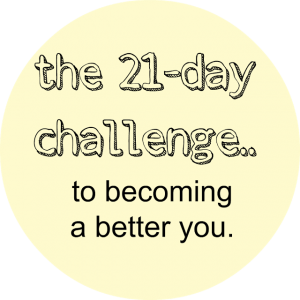21-Day Challenge to Transform Yourself
— December 2, 2014
The concept of self-improvement is not new, but the challenge of committing to small, meaningful changes over 21 days has the power to redefine habits and alter perspectives. The 21-day timeline is based on the idea that this duration is enough to establish a habit when practiced consistently. The challenge below offers actionable steps to focus on key aspects of personal growth, enhancing not just your well-being but also how you contribute to the world around you. These simple yet powerful tasks can create lasting positive change.
Stop Complaining: Shift Your Mindset to Gratitude
Complaining often feels like a natural reaction to stress or frustration, but it doesn’t solve problems. Instead, it fosters a negative outlook, affecting your mood and productivity. If you monitor your thoughts and speech, you may be surprised at how often complaints arise. Whether it’s “I’m so tired” or “There’s too much work,” these thoughts do nothing to address the situation.
For the next 21 days, aim to eliminate complaints entirely. Instead of dwelling on what’s wrong, focus on what’s right. Replace complaints with gratitude. For instance, when faced with a pile of laundry, think, “I’m thankful for clean clothes.” By reframing your thoughts, you not only cultivate happiness but also build resilience.
Practice Kindness: Create a Ripple Effect
Kindness has a transformative effect on both the giver and the receiver. Starting each day by offering a compliment to yourself can boost your confidence and set a positive tone. Extending this habit to others is equally rewarding. Whether it’s complimenting a colleague’s effort, thanking your spouse, or encouraging a friend, these small gestures can brighten someone’s day and strengthen relationships.
Commit to giving three sincere compliments daily for 21 days. These acts of kindness may seem small, but they encourage a culture of positivity and mutual respect. Moreover, you’ll notice how uplifting others uplifts you in return.
Volunteer and Serve Others: Build a Stronger Community
Helping others fosters empathy and broadens your perspective. While daily volunteering at a formal organization may not be feasible, serving your family, friends, and neighbors can be equally meaningful. Simple acts, like helping a family member with a chore or supporting a friend through a tough time, can make a difference.
Set aside time each week to volunteer formally or informally. Whether it’s an hour at a local nonprofit or cooking a meal for someone in need, the goal is to consistently prioritize service. For 21 days, focus on making a tangible impact in someone’s life, no matter how small the action may seem.
Avoid Procrastination: Act Now, Not Later
Procrastination is often rooted in fear or a lack of motivation, but it only creates more stress in the long run. Tackle this by adopting the principle of “do the worst thing first.” Begin your day by completing the task you dread the most, and the rest of the day will feel lighter.
To avoid falling back into old habits, use tools like to-do lists or productivity apps. Commit to this practice for 21 days, ensuring you complete tasks early rather than putting them off. As you stay consistent, you’ll notice increased efficiency and reduced anxiety.
Practice Acceptance: See the World Through Others’ Eyes
Judging others can create barriers and hinder relationships. Instead of focusing on what you perceive as flaws in others, practice empathy. Understand that everyone faces struggles and challenges, some of which you may not see. This doesn’t mean condoning negative behavior but rather extending compassion.
For 21 days, make a conscious effort to accept people and situations as they are. Whether it’s a colleague who makes mistakes or a friend who’s made a poor decision, approach them with understanding. By doing so, you strengthen connections and foster a more supportive environment.
Create and Stick to a Budget: Master Financial Awareness
Financial stress is a common issue that can impact every aspect of life. Creating a budget and sticking to it is a proactive way to address money-related challenges. By identifying spending habits and setting clear limits, you can reduce unnecessary expenses and achieve greater financial stability.
For the next 21 days, outline your income, essential expenses, and discretionary spending. Monitor your progress daily, adjusting as needed. This habit not only helps you save money but also teaches discipline, a skill that can be applied to other areas of life.
Embrace Positivity: Overcome Negativity
Negativity can feel overwhelming, especially in challenging situations. However, focusing on the positive helps you navigate difficulties more effectively. When faced with an unchangeable situation, approach it with faith and determination. For instance, if a project feels overwhelming, break it into smaller, manageable steps rather than giving in to frustration.
Commit to maintaining an optimistic outlook for 21 days. Surround yourself with positive influences, whether it’s motivational podcasts, uplifting friends, or inspiring stories. By consciously avoiding negative thoughts and conversations, you can create an environment of growth and encouragement.
Step Out of Your Comfort Zone: Discover New Possibilities
Growth happens when you challenge yourself. Whether it’s learning a new skill, trying an unfamiliar activity, or meeting new people, stepping out of your comfort zone fosters confidence and adaptability. It’s easy to stay where you feel safe, but true fulfillment comes from embracing the unknown.
For 21 days, do something each day that pushes your boundaries. It doesn’t have to be extreme; even small steps, like initiating a conversation or trying a new hobby, can have a significant impact. These experiences not only help you grow but also make life more exciting and enriching.
Reflect and Commit to Progress
Change is not about perfection but progress. By dedicating 21 days to each habit, you build a foundation for lasting improvement. At the end of six months, you’ll have cultivated a series of positive habits that contribute to a better version of yourself. The cumulative effect of these small changes can transform your outlook, relationships, and overall quality of life.
These practices align with qualities that are vital in personal and professional development. For instance, industries like IT outsourcing, mobile app development, and web development—areas where S3Corp excels—require discipline, innovation, and adaptability. Applying the principles of this challenge can make you not only a better individual but also a stronger contributor to your career and community.
Embark on this 21-day challenge and see the difference it makes.






